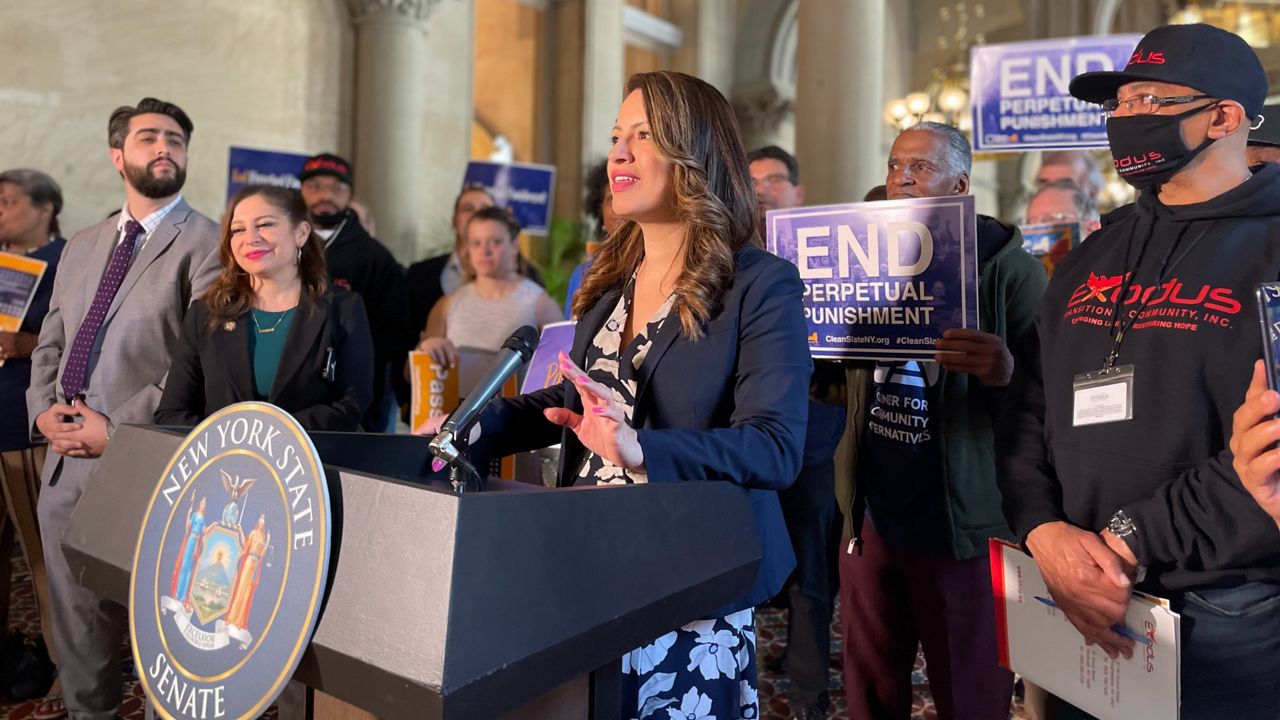Legislative sources say New York lawmakers plan to pass the Clean Slate Act before session ends June 2 that would seal New Yorkers' criminal records after a set period following their sentencing.
Lawmakers expect to pass a version close to the Senate bill sponsored by Sen. Zellnor Myrie, a Democrat from Brooklyn, that would automatically seal the criminal records of New Yorkers three years after sentencing for a misdemeanor offense and seven years for a felony.
"I think it may come down to a two-way deal," a person familiar with the Legislature's negotiations said Wednesday. "During budget, Assembly and Senate were closely aligned on Clean Slate."
The bill was nearly included in the Legislature's final $220.4 billion 2022-23 budget passed last month, but hit a snag in negotiations. Gov. Kathy Hochul included the Clean Slate Act in her executive budget proposal, but senators and assemblymembers could not agree with the governor, who wanted to make the three- or seven-year waiting periods begin both after the person's maximum sentence and probation period expires — potentially increasing the wait for a person's records to be sealed by several years.
"Gov. Hochul is committed to creating a safer and more just New York, which is why she worked with the legislature to craft a budget that included a comprehensive public safety plan that cracks down on illegal guns, protects victims of hate crimes and domestic violence, and stops the cycle of repeat offenders," First Deputy Press Secretary Avi Small said Wednesday. "After making the Clean Slate Act part of her 2022 State of the State agenda, the governor will continue working with the legislature to take much-needed action to keep New Yorkers safe while righting the wrongs of an unjust criminal justice system."
Lawmakers are expected to pass a bill this session without amending the three- or seven-year waiting period to seal records.
"The timing has been our sticking point," said Assemblymember Catalina Cruz, a Queens Democrat who sponsors the measure in the lower house. "Sen. Myrie and I still remain very much committed to ensure that we pass Clean Slate. We're working through the process. ...Too many people have been waiting decades, so we are going to get it passed this year."
The measure has remained in the Assembly Codes Committee since January. Senators moved the measure to the Finance Committee on April 25.
"We are continuing to discuss it with our members," Assembly spokesman Mike Whyland said Wednesday.
About 2.3 million New Yorkers would have their criminal records sealed if the bill is signed into law.
Past criminal records often hinder formerly incarcerated people from entering the workforce, furthering their education or securing housing.
About 70 million Americans have an arrest or conviction record. Excluding formerly incarcerated individuals from the workforce reflects an estimated $78 billion to $87 billion loss in Gross Domestic Product, according to a U.S. Chamber of Commerce study.
"What people need to understand is this is no way trying to supersede what a judge has already sentenced someone to," Cruz said. "It's only saying if they've completed their sentence to society and they have come out and demonstrated that they are looking forward to being good, contributing members of society, we are looking forward in this bill with the idea of giving that person a real second chance."
The bill has gained momentum this year with support from major Fortune 500 companies including Microsoft, Verizon and JP Morgan, as well as nearly 50 law firms across the state, major unions, businesses and faith leaders after it nearly passed the Legislature last year, but died after a bill drafting error.
Voices echoed throughout the halls of the Capitol late Wednesday morning as advocates rallied, shouting the Legislature cannot wait to pass Clean Slate.
Advocates said the bill would break systemic barriers and cycles of poverty for formerly incarcerated people who face employment and housing discrimination after release.
"It's time to end perpetual punishment," said Center for Community Alternatives Director of Organizing Marvin Mayfield, a formerly incarcerated New Yorker. "It's time to provide all New Yorkers with access to jobs, housing and education. It's time to pass the Clean Slate Act."


